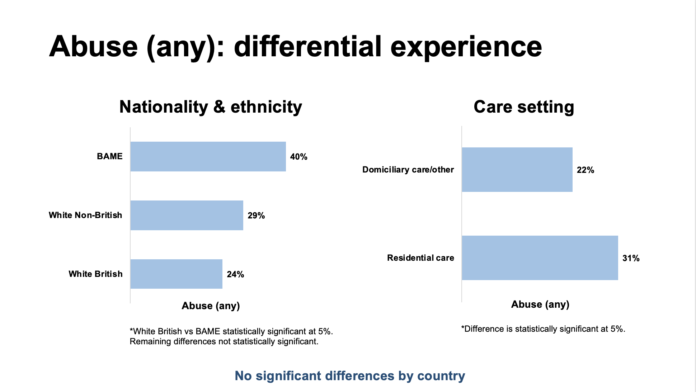Professor Shereen Hussein and Dr Eirini-Christina Saloniki presented interim findings from the RESSCW study funded by the Health Foundation at the the International Long-Term Care Policy Network, LTCcovid, Workshop 6-7 December 2021.
The social care workforce faced unprecedented challenges during the COVID-19 pandemic, characterised by adverse working conditions, including low pay, high workload, and disproportional staff shortages. While the pandemic exacerbated these conditions, it also brought concerns about mistreatment of the workforce in the form of abuse – by co-workers, service users, their families, and the public. Such experiences can vary depending on personal and work characteristics, particularly affecting minority ethnic groups. They can subsequently impact workers’ wellbeing and the sector overall (in the form of quits).
This presentation will draw on findings from the first wave of a longitudinal survey as part of the Retention and Sustainability of Social Care Workforce (RESSCW) project. The analysis was conducted on 1,037 UK valid responses received between April and June 2021 and examined the impact of COVID-19 on workers’ working conditions, general health and wellbeing, and intentions to leave the employer and sector altogether. The findings highlight worrying experiences of abuse amongst the survey respondents, which vary significantly by nationality, ethnicity and care settings. The analysis further showcases the negative impact of experiencing abuse on work-life balance (and wellbeing more broadly) and intentions to quit whilst emphasising the need for targeted measures that promote workers’ physical, emotional and financial wellbeing.
The findings have important policy and practice implications and call for actions to enhance the working conditions and wellbeing of care workers. This includes a recognition of the significant impacts of COVID19 on the wellbeing and work outcomes of workers and in devising suitable post-recovery strategies.
Co-authors:
Shereen Hussein (London School of Hygiene & Tropical Medicine), Grace Collins (University of Kent), Catherine Marchand (University of Kent) and the RESSCW research team
To find out more about this project:
COVID-19 and the wellbeing of the adult social care workforce: Evidence from the UK (Pulse survey findings)
Early findings from a social care workers’ longitudinal survey (Wave 1): COVID-19 implications(Longitudinal survey; wave one early findings)
Founder and Director
Shereen Hussein is a Health and Social Care Policy professor at the London School of Hygiene and Tropical Medicine (LSHTM), United Kingdom.
Shereen Founded the MENARAH Network in 2019, through an initial grant from the Global Challenge Research Fund, UKRI. She is a medical demographer with expertise in ageing, family dynamics, migration and long-term care systems. Shereen regularly collaborates with the United Nations, the World Health Organisation and the World Bank in policy and research focused on ageing in the Middle East and North Africa Region.
Shereen received her undergraduate degree in statistics and a postgraduate degree in computer science at Cairo University. She completed an MSc in medical demography at the London School of Hygiene and a PhD in quantitative demography and population studies at the London School of Economics and Political Science, United Kingdom.



